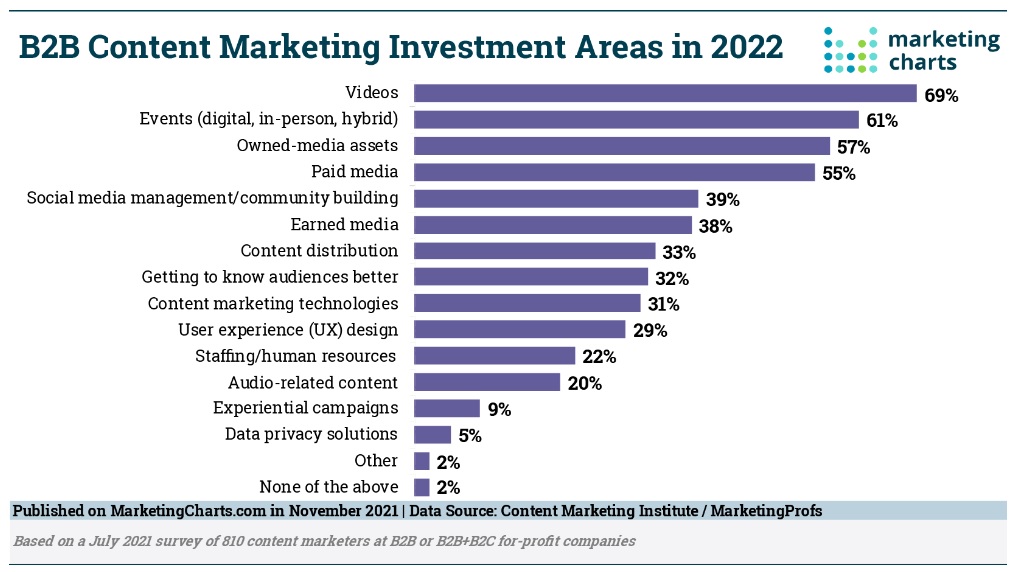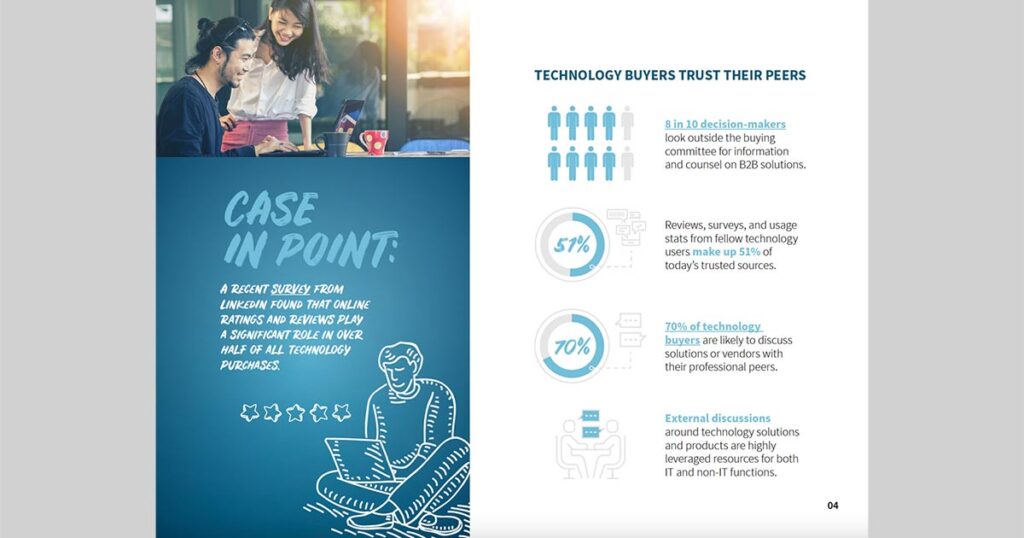As an industrial manufacturer that serves other businesses, your marketing needs vary greatly from other types of companies. Your B2B product marketing must target the right audience to get the results you need.
Unlike B2C businesses that focus on individual consumers, you must target the decision-makers in a business. However, like consumers, most business buyers expect a personalized buying experience. Giving your prospective customers this experience is where your marketing strategy can make a big difference.
We are going to share some tips and strategies you can use to improve your B2B product marketing, target the right people, and earn the loyalty of your customers.
Key Takeaways
- For the best B2B product marketing, you need to understand your buyers’ needs.
- Customer personas can help you target your marketing toward the right audience.
- Accessible content can educate potential customers about your brand and products before they are ready to reach out.
What Is B2B Product Marketing?
B2B product marketing is the promotion of one business’s products to other businesses and organizations. B2B marketing tends to be more informational than B2C marketing, with straightforward facts and technical product specifications. Businesses tend to focus on revenue impacts, while the average consumer is rarely concerned with ROI.
B2B marketers must concentrate their efforts on key decision-makers and sometimes buying committees. This focus creates a complex atmosphere for marketing materials.
6 Proven Strategies for B2B Product Marketing
For the best return on your investment, you want to focus on proven B2B marketing techniques that attract the right audience.
1. Understand Your Buyers’ Needs
As an industrial manufacturer, your target audience has very specific needs. Instead of searching for a supplier for “steel pipe,” they are more likely looking for something like “106 carbon steel pipe.” Because of highly specific needs like this, mass marketing techniques do not always work for industrial manufacturers. B2B product marketing for manufacturers requires a specific, targeted approach.
2. Create Target Personas
Who are the customers you would love to attract? That ideal customer can help you create some target personas. These personas represent the various decision-makers who would interact with your product marketing.
To create a persona, you imagine the real person. You can even give them a name. You can include as much detail as you want for each persona. Personas typically include:
- Demographic information
- What is their role at their company?
- Are they decision-makers?
- Where do they spend time online?
- What are their interests outside of work?
- What products and solutions are they searching for?
- What problems do they need to solve?
With your personas in place, you can adjust your marketing strategy to fit their needs better and keep them engaged.
3. Establish Authority Through Content
The content you offer your potential customers is crucial for B2B product marketing. Most B2B customers are further down the sales pipeline before they make first contact with a business. These customers do a lot of research on their own. To make sure they are getting the right information on your business and products, you need to give them content that establishes your brand as an authority in your industry. When they think about the products you sell, you want your brand to be the first company they turn to.
While blogs, e-books, and charts are all excellent sources of information for your leads, many B2B customers are looking for videos. The Content Marketing Institute reports that 69% of B2B businesses are investing in video content more than any other type of content in 2022.

As an industrial manufacturer or distributor, video content can be a great resource. You can show off your products and record demonstrations of how they work. Videos can help potential customers decide if your products will be the right fit for their needs. Videos could also pique their interest enough that they contact your sales team to learn more.
This video shares some good ideas on what types of marketing videos a B2B company should have.
Source: Next Level Marketing on YouTube
Other popular types of B2B content include:
- Blog articles
- Webinars
- Case studies
- Infographics
- White papers
- Social media posts
- E-books
- Podcasts
- Research reports
- Print materials
- Livestreaming content
You should also consider offering gated content. This material is typically high-value content, like a research report or e-book, that you offer in exchange for something, usually an email address and other contact information. Gated content is a great way to generate leads.
4. Make Your Business Always Accessible
While you may not have a 24-hour business, potential customers may be searching for solutions outside of your business hours. If someone has a question, you need a way for customers to get an answer, no matter what time of day it is.
This real-time business approach helps you keep up with the expectations of modern customers. Even B2B customers expect fast responses to inquiries.
Here are a few popular automated methods to help address customer service needs:
- Live chat or a chatbot when an agent is unavailable
- An auto-scheduler for sales calls and demos
- Product demonstration videos that are always accessible
- Auto-response emails that let customers know when someone will be available
- Automatic lead capture forms
- Research reports
- Print materials
5. Communicate with Your Customers
Customers want to feel appreciated. One great way to show how much you value your customers is to routinely ask for their opinion. As they use your products, they likely discover issues and product difficulties that your design team may have missed. Ask them to share these issues with you. You could establish a formal Voice of the Customer (VoC) program to keep up with this communication.
As you gather this customer input, communicate your findings with your customers. Let them know that their input is making a difference. Then, use those success stories in your marketing to attract new customers. Just like general consumers, B2B customers want to purchase from businesses with strong customer communication and customer support programs.
6. Share Customer Reviews
Knowing that someone else has had a positive experience with your products can have a major impact on someone else’s decision to purchase. While reviews of industrial equipment and parts might not be as common as reviews on technology or consumer goods, they can still be a valuable marketing tool.
Ask your customers to leave reviews on your products and make it easy for them to share their honest opinions.
A research report from LinkedIn showed that just five reviews on a product quadrupled the chance of someone buying it.

Don’t be afraid of negative reviews. If you get a negative review, consider it a chance to be proactive. Respond promptly to the not-so-positive reviews to see if you can resolve the customer’s issue. Many times, customers become more loyal after a company fixes a problem than if there was never a problem, to begin with.
Revamp Your B2B Product Marketing with Shanahan Strategy
At Shanahan Strategy, we only work with manufacturing companies. With this single focus, we have a deep understanding of what kind of marketing works for manufacturers. It is not the same type of marketing used for consumer-based brands.
Are you tired of getting poor results from other marketing firms? Contact Shanahan Strategy today to learn about our B2B digital marketing strategies.

